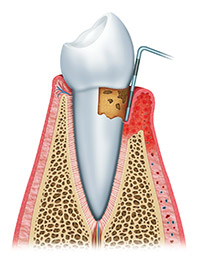Periodontal (gum) Disease

Gum disease (also called periodontal disease) is an inflammation or infection of the surrounding soft tissues of the tooth (gum) and the supporting bone. It is caused by the bacteria in tartar, a hardened form of plaque that harbors bacterial clusters and can only be removed by a dental professional. The bacterial clusters in tartar produce acids and toxins that cause gum irritation, swelling, and redness. This inflammation can often spread below the gumline and cause gums to bleed, recede and separate from the teeth, and eventually causes the bone underneath to deteriorate and the teeth to come loose.
Periodontal disease is a progressive condition and is still the leading cause of tooth loss among adults.
The most common symptoms of periodontal (gum) disease listed in the order of disease progression are:
- Red, puffy, sensitive gums
- Gums that bleed during brushing or flossing
- Gums that separate from the teeth, forming deep pockets between the tooth and gum that provide large living spaces for harmful bacteria
- Gums that recede, leaving teeth more exposed as the destruction of the surrounding gums and bone progresses
- Persistent bad breath caused by the infection
- Shifted and loosened teeth
- Teeth that may become so loose that they may need to be extracted
Even though the main cause of periodontal (gum) disease is bacterial tartar, some people are especially prone to it including people who:
- Suffer from diabetes
- Have a weak immune system or immunodeficiency
- Are experiencing hormonal changes, including pregnant women
- Have misaligned teeth or poorly-fitted mouth appliances such as braces, dentures, etc.
- Have poor nutrition
- Are under constant stress
- Are on certain medications such as Phenytoin or some birth control pills
The good news is that if diagnosed in its early stages, periodontal (gum) disease can be successfully treated.
Periodontal (Gum) Treatment
Periodontal treatment options depend on the progression of the disease and may include:
- Periodontal cleaning( also called deep cleaning) which involves the removal of bacterial tartar and toxins from the deep pockets between the tooth and gum, followed by polishing and smoothing of the tooth and root surface
- Antibiotic treatment, including an option of delivery of a special antibacterial medication directly into the gum pockets (i.e. arestin, periochip, etc.)
- Dental home care instructions, including special oral hygiene aids as needed and antimicrobial mouthwashes and tooth pastes to help combat infection and promote healing
- Regular periodontal maintenance cleanings( usually performed 4 times per year)
- Periodontal surgery( in more advanced stages of the disease with severe bone destruction when all previously mentioned treatment options are not sufficient enough to restore periodontal anatomy and reduce pocket depth down to normal sizes)
Excellent oral hygiene habits and regular periodontal cleanings are equally important in preventing serious dental and general health problems associated with periodontal disease as well as maintaining your healthy beautiful smile for many years to come.



